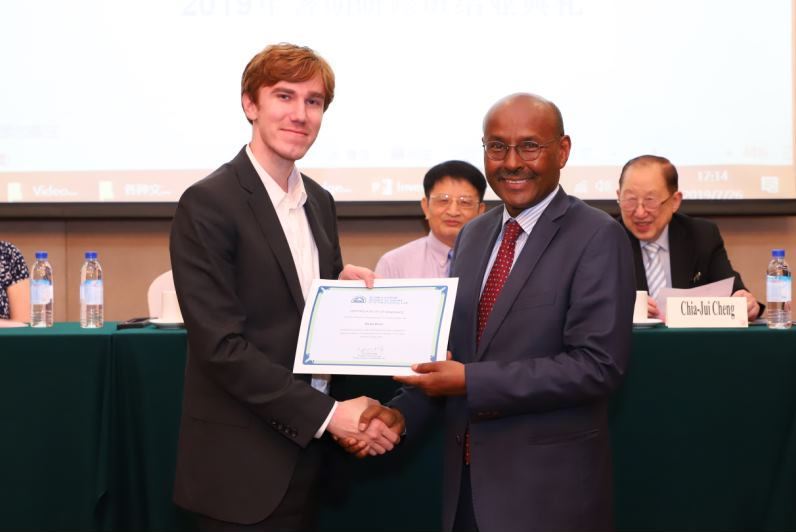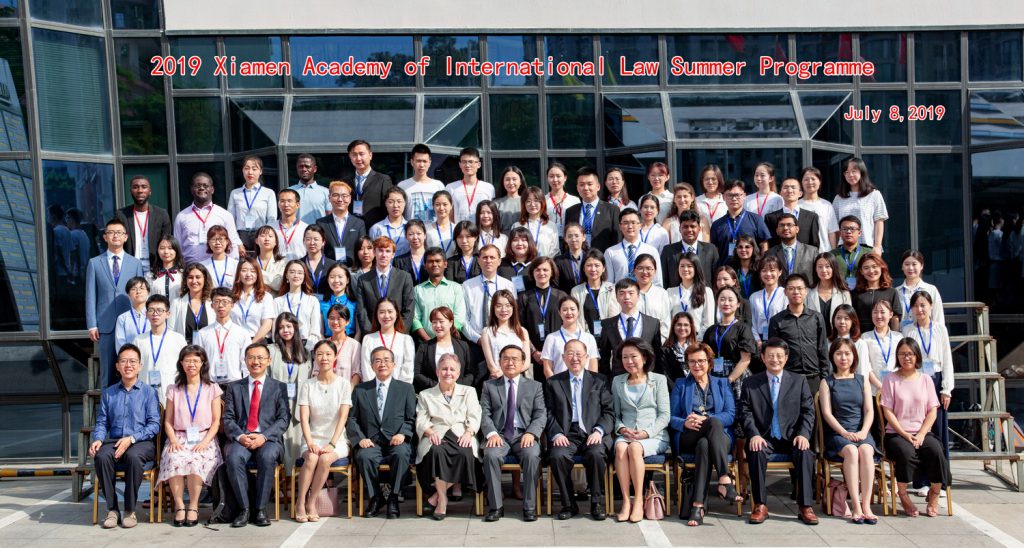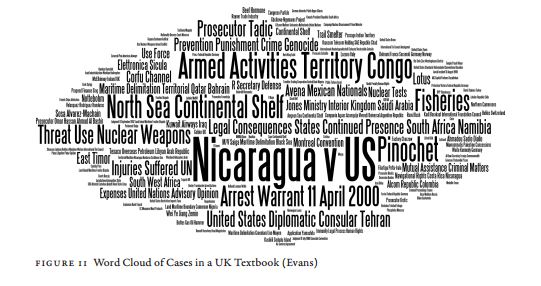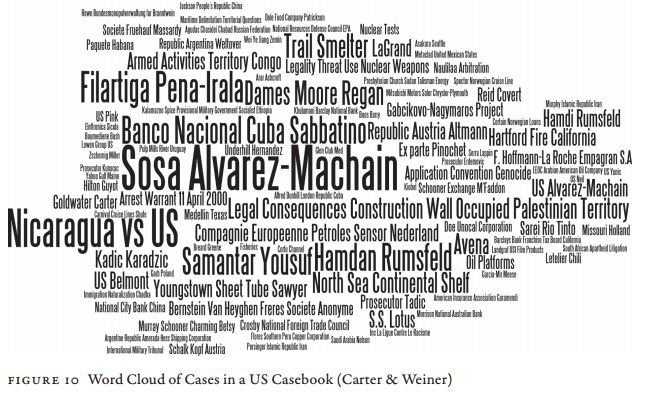By: Dylan Davis, JD 2020
This summer I had the privilege of attending the Xiamen Academy of International Law in Xiamen, China. I would like to thank the Whitney R. Harris Institute for this opportunity, from whom I had the fortune to be granted the 2019 Dagen-Legomsky Xiamen Fellowship.
The Xiamen Academy is a three-week program in Xiamen, China, offering several classes led by prominent international law scholars on a broad range of subjects. Among the classes offered, for example, were “International Law of the Atmosphere” and “Investment Treaty Law” were both counted among the courses offered. Another course, “International Law and the Public Law of Africa,” provoked particular interest among the attendees, in part because it was taught by the current President of the International Court of Justice, H.E. Judge Abdulqawi A. Yusuf.

In the remainder of this article, I would like to focus on a particular lecture by the Australian legal scholar Anthea Roberts. She lectured on her recent book, “Is International Law International?.” This book explores this provocative question and involves a sociological study of how various regional understandings of international law are constructed. She looked at differences in legal pedagogy, networks of social capital, and other historical factors to both explain and illustrate that there is no single, universal international law.
Anthea Roberts recalls a saying by Oscar Schachter, wherein he terms the community of international law practitioners an “invisible college,” meaning that, despite these lawyers’ different national backgrounds, they share a common, internationalized version of the law, supported by an informal network of institutions and discourses. In opposition to this image of an ostensibly “unified” international law, Roberts subverts Schachter’s phrase by referring to the field as a “divisible college.” Roberts writes, “I suggest that international lawyers may be better understood as constituting a ‘divisible college’ whose members hail from different states and regions and often form separate, though sometimes overlapping, communities with their own understandings and approaches, as well as their own distinct influences and spheres of influence.” [1].
My experience at the Xiamen Academy was suitable for demonstrating the premises behind Roberts’ work. The majority of the program attendees came from mainland China, while many others were from Georgia, India, Ghana, South Korea, and additional States. I myself am from the United States of America. Through our shared lessons and many conversations, I have come to believe that my colleagues might have come to a different version of international law than myself. As such, I fully vouch for the conclusions of Robert’s work and claim my experiences align with her description of the field.

Different Introductions to International Law
Roberts emphasizes the influence of legal education on the substance of international law. Two areas she discusses are the impact of textbooks and their potential national biases, and the influence that the geographical flow of students between States has. Regarding the use of textbooks and their content, I realized that around half of the students in attendance had all used the same British textbook for public international law, despite coming from a rather wide range of countries. In another example, I have not yet been assigned the case Nicaragua v. United States while in law school in the United States, although almost every other student was deeply familiar with that case – which conforms to the disparity noted in Robert’s research.
Roberts describes a tendency of non-Western students to come study in the West (predominantly to the United States and the United Kingdom), yet notes a lack of Western students who seek any legal education outside the West. While I was at Xiamen Academy, I met only one or two other Americans who were taking advantage of the opportunity to study outside of the Western hemisphere. Yet the majority of non-Western students I spoke with had either studied in the United States and the United Kingdom or had plans to do so in the future.
The Relative Importance of Areas of Law
Another place where Roberts’ premise was visible was regarding students’ research specialty. At the Xiamen Academy, with its many international students, the choice of specialty often fell in areas outside the scope of a ‘traditional American’s’ studies. For example, two of the most common areas of law that students were pursuing were the Law of the Sea and the Law of Cybersecurity. Less common – but still prevalent and less common in the United States, it appears – was the Law of Outer Space. Indeed, this relates to Roberts’ basic framework, wherein one’s lived situation and everyday experiences determine the emphasis one places on particular areas of study, and, by extension, influences how we view international law as a whole. Thus, it is hardly surprising, given current affairs, that many Chinese students are likely to take up these topics.
Roberts further explained that a country’s international law journals generally have special affinities for certain ways of thinking that are then perpetuated through the wide publication and domestic reach of their journals. For example, law journals in the United States are characterized by a heavier emphasis on realism and economic analysis. Roberts argues that our view of international law is likely to be influenced by the particular ideological framework through which we are introduced to the field. The influence U.S. legal journals have had on my way of approaching legal ideas was demonstrated when, during the lectures, I was surprised by the lack of economic discussion, as well as the commitment to positivism by some. Furthermore, Roberts notes a potentially troubling fact: academia, depending on the country, can often be extremely nationally insular, and often engagement with that country’s journals is necessary for academic success. For example, France and Russia are often noted for rarely communicating and carrying on an academic dialogue with other academic communities. In turn, certain communities turn into an echo chamber, and academics may feel compelled to play by the rules of these systems, ultimately limiting the flow of ideas out of the necessity to advance professionally.
The Different Interpretation of Concepts
Finally, Roberts’ work often demonstrates that different States have varying interpretations of concepts that are nominally the same. This sometimes occurs simply due to the shortcomings of language, as she explains: “Some English-language concepts (such as jurisdiction) are also not identical to the nearest French equivalent (like compétence), making translation again inadequate.” [2]. More often, though, this happens out of political considerations: legal concepts are not judged solely on their abstract validity, but are sometimes promoted in line with national, political strategy. For example, Roberts discusses the concept of “self-determination,” and how it has been treated differently in academic communities with respect to Kosovo and Crimea.
In another example, China has largely been critical of the concept of “humanitarian intervention,” considering it illegitimate under international law. Perhaps unsurprisingly, U.S. actions in Iraq were a target of frequent criticism in this regard during the program. Yet I thought it noteworthy, that China has not seemed to suffer the same fierce and almost unanimous criticism in analogous situations. This too comports with Roberts’ assessment of China on the subject, as she notes that it is common practice for textbooks to omit or be silent on subjects that would cast an unflattering light on China. My experience at Xiamen Academy would confirm this view, as certain topics that to me seemed obvious to discuss and consider from an international legal perspective were never openly discussed, such as the ongoing protests in Hong Kong protests, the treatment of the
Uyghur people in Xinjiang, another other so-called ‘sensitive’ topics.
Overall, I had a wonderful and truly eye-opening experience at the Xiamen Academy of Internationa Law. As Robert’s research clearly demonstrates, diversifying one’s legal education and experiences is incredibly important, and I am grateful that my perspective on international law has been broadened with this global experience. Although Roberts’ research indicates that the global flow of students is heavily weighted towards the West, I anticipate that the balance will shift in China’s direction in the near future, in part because of the strength of such programs like the Xiamen Academy of International Law.
Citations [1] and [2] refer to p. 2 and p. 96 of Anthea Roberts’ “Is International Law International?”, Oxford University Press, 2017.
The two WordCloud photos were taken from the same book.


